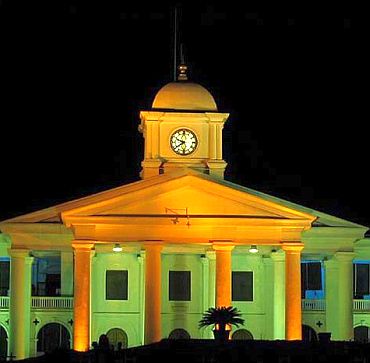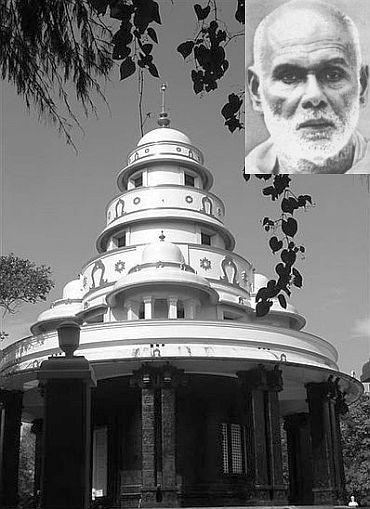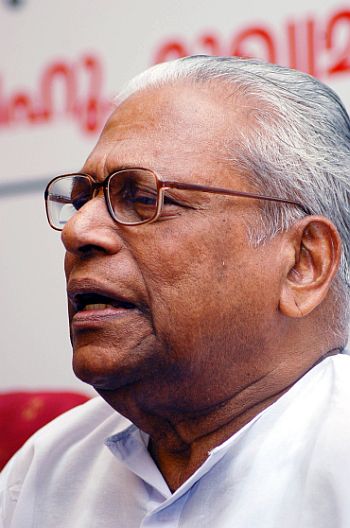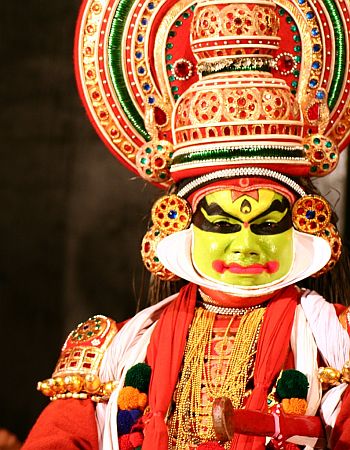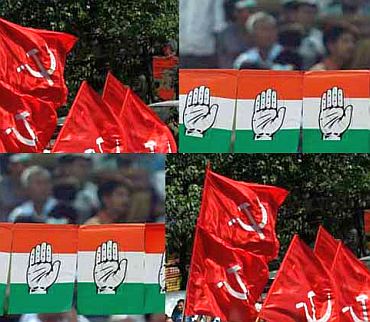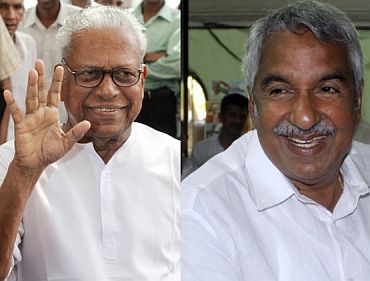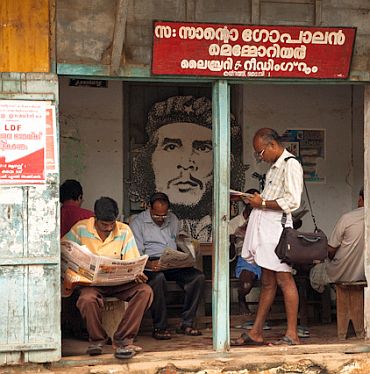 | « Back to article | Print this article |
A shameful act in the most literate state
Former diplomat and rediff.com columnist M K Bhadrakumar travelled to Kerala exclusively for us to report on the crucial state assembly election underway there, and finds the Left about to face its defining moment in state politics.
When a top official superannauted recently -- no less than the head of office of the Kerala state government's registration inspector-general -- his office room in Thiruvananthapuram and the official car he used were 'cleansed' with cow dung. This is an ancient ritual in this part of India when a "lower" caste fellow "polluted" the environs by his sheer presence or physical contact.
Coverage: Assembly Elections 2011
The outgoing inspector-general was a Dalit. It might seem incredible that such a primitive ritual was enacted in the early part of the 21st century in the most literate state in India, which was attuned to "progressive" politics as far back as 1957 when it voted in a communist government through democratic ballot.
Actually, the shameful incident took place while a communist-led government is in power. Kerala's most respected vernacular daily Mathrubhumi commented in an editorial titled 'A Return to Dark Ages?': 'Outsiders are under the impression that Kerala has a social milieu that has overcome caste and religious prejudices. This episode indicates that like in many other aspects, Malayalis continue to dissimulate (obfuscate) on matters of caste prejudices. Swami Vivekananda had once described Kerala as a 'lunatic asylum' for its inhuman caste-ridden society.'
Click on NEXT to read further...
Narayana Guru understood class struggle in Kerala before the first Marxist Malayali did
The sad reality is that the great social renaissance that began appearing towards the end of the 19th century and which eventually encompassed almost all sections of Kerala's society by the early decades of the 20th century has virtually dissipated.
Sree Narayana Guru's social reform movement was multi-tiered; it had templates of revolt, resistance, justice, equality and fraternity and enlightenment and spirituality.
His mission defied the caste hierarchy and sought to "liberate" the downtrodden from their obscurantist beliefs while exhorting that education held the key to progress and social advancement.
It boggles the mind that much before the first communist Malayali appeared on the planet, Sree Narayana Guru understood that caste discrimination had an economic basis and the struggle against the obscurantist caste system was quintessentially the class struggle in Kerala.
Without doubt, that "cultural revolution" provided the political backdrop for the subsequent rise of the communist movement in Kerala in the 1950s.
However, as the communists under their middle class leadership took to bourgeois democracy in a big way in the late 1960s, a contestation began for political space with the Congress.
Both UDF and LDF don't project social reforms anymore
This was waged through the 1970s and 1980s until it found an uneasy equilibrium in the emergence of two systems of alliances in the nature of two "united fronts" arrayed against each other. The result has been the politics of compromise and the sharing of power within and through coalitions that Kerala has been witnessing in the recent decade or two.
Neither the Congress-led United Democratic Front nor the communist-led Left Democratic Front feels the urge to project the agenda of social reforms anymore.
This was only to be expected since the political compromise essentially preserves and perpetuates the interests of the very middle class that had its origin in the old caste system. The basis of this compromise is power-sharing. And this compromise has enabled the swift return of the upper caste dominance.
This compromise is also at the root of the social exclusion that women, Dalits, adivasis, etc face today in Kerala. Leave alone fighting caste oppression, political parties have no interest in waging struggle against corruption or atrocities against women and such other social ills that have reappeared.
To cut a long story short, the political compromise also led to an unintended finale to the much-touted land reforms, which in the event failed to trigger the social revolution that it heralded. An impasse prevails today also over another reform area that aroused much hope and expectations when the first communist government was formed in 1957 -- education.
Communists are to be primarily blamed for the state of affairs
Thus, by the beginning of the 21st century, the Kerala society had begun forfeiting one by one most of the gains of the social and cultural renaissance.
The Communists are to be primarily blamed for the state of affairs since they were the biggest beneficiaries of the progressive politics that the renaissance opened up in Kerala and their cadres were (and continue to be) predominantly drawn from the lower classes.
Thus, the politics of VS Achuthanandan needs to be assessed against a complex backdrop. Prima facie, it baffles an outsider how this 87-year old veteran communist leader continues to strike a chord among the cadres of the Left parties and the lower classes in general.
The heart of the matter is that VS's politics is viewed by the common people as the antithesis of the politics of compromise.
Interestingly, VS has been the one and only political leader in Kerala who took time out from the current election campaign to hail the "historic struggle" against corruption by the "great Gandhian" Anna Hazare.
Not only did VS empathise with Hazare's initiative but he identified with it and linked it to his own crusade against corruption. VS wrote: 'Eradication of corruption, crackdown on the attacks on women, establish genuine gender equality -- these are key topics of discussion in the current election in Kerala. Anna Hazare's fast in Delhi is a great event that imparts inspiration for the historic struggle in Kerala against corruption and crimes against women.'
The VS phenomenon is much bigger than what is commonly perceived
He added: 'Anna Hazare's agitation may have inherent limitations in its political content and focus. But it has succeeded in shaking up the corruption-ridden UPA government and in awakening the country's conscience.'
Ironically, this is also VS's predicament. He strikes resonance among the common people. But it remains unclear how he can take his mission to its logical conclusion.
VS went on to define his own mission: 'Kerala has outstripped the national indices in welfare measures, standard of living, and social infrastructure development such as health, education. But this development needs to go hand in hand with addressing the immediate term and long-term political problems -- correcting the imbalances in development, protection of the enviornment, offering resistance to all forms of exploitation, corruption and persecution of women -- and waging relentless struggle against social evils and decadence.'
Evidently, the VS phenomenon holds a much bigger dimension in Kerala politics than what is commonly perceived. In sum, the great social and cultural renaissance of the last century put Kerala on a trajectory of progress.
But in the event, by the second half the 20th century, the state's progress began slowing down. Caste prejudices and decadent social practices such as male chauvinism began reappearing.
Political power has come to acquire its own logic
The VS phenomenon underscores that the Left in Kerala is at a historical crossroads. The exigencies of bourgeois democracy seem to leave the Communists no choice but to make tactical adjustments.
At the end of the day political power has come to acquire its own logic, especially when power can be seized without the hardships of a revolution.
Enormous avenues have opened up to pursue the politics of privilege and at various levels this is happening, ranging from elected representatives, trade unions and feeder organisations to even youth wings and student bodies.
For all appearance, therefore, the "Party is growing", and there is neither any sense of crisis nor any need of rectification. But then, membership of party organisation is very often seen as passport to employment or as safety net rather than a matter of ideological commitment.
The recent unprecedented exit of two top CPM leaders and their joining the Congress party within hours shows up that the ideological cohesion of the party at leadership level has become dramatically shaky.
This is not the first time Communists got disillusioned with the party, but such crass "defection" to the Congress was unheard of.
The Malayali voter today hardly has any political choice available
With the retreat of ideology or principles, money has become the main instrument of capturing political power and even politicians with integrity have become passive spectators of the illegal methods by which "fund collection" takes place.
Indeed, the Communists are not alone in Kerala in subscribing to this bourgeois culture, but in their case, the practice becomes abhorrent since it not only comes to erode their ideology-based identity but, more important, threatens to influence their policies.
The steady draining of social values in Kerala resulting from the exigencies of coalition politics has, in turn, negatively impacted the Left's political culture. A nexus has formed between politicians and anti-social forces such as the 'land mafia', 'liquor mafia', 'forest-encroachment mafia' and so on.
Since this is a mutually beneficial contract, reform from within the political system becomes too much to expect. Indeed, EMS Namboodiripad and AK Antony (both former chief ministers) at one time had put forward ideas of rectification but realised that they found little acceptance even within their own parties.
In short, the "uncommitted" Malayali voter today has hardly any political choice available. Even if he were to choose the Congress-led UDF in the polls on April 13, he would be acutely conscious that five years hence he would have no choice but to revert to the communist-led LDF to run the successor government.
A defining moment is coming up for the Left in Kerala
The 'bipolar' political system hardly compels the Left to rethink its political strategies, either. As the "tough fight" in the current election underscores, even tiny interest groups need to be accommodated and ideological cohesion takes a back seat. Even a tacit deal with the Jammat-i-Islami seems passable if that would help gain a clutch of additional votes in the "tough fight" on Wednesday.
On the other hand, politics of convenience has begun taking its toll. Communist cadres are getting increasingly disoriented as several instances testified in the recent period. After all, they just managed to get the central leadership of their party to reverse the original decision by the state leadership not to give candidacy to VS in the present election.
Will the central leadership intervene again if there is yet another attempt in the coming weeks and months to marginalise or exclude VS?
From the statements by Sitaram Yechury and Buddhadeb Bhattacharya, it appears that influential sections within the CPM's politburo realise the pivotal role VS plays in the mass mobilisation that is vital to the programme of any communist movement. All in all, a defining moment is coming up for the Left in Kerala.
